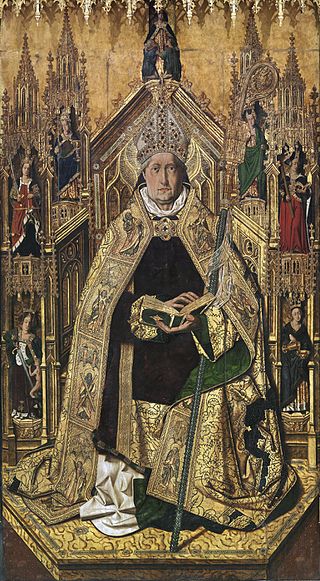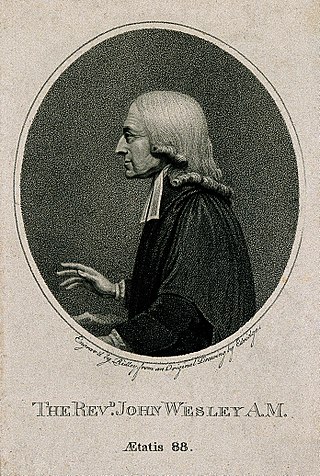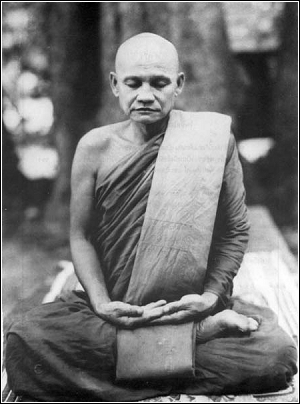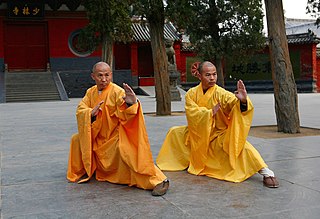Father has been used as both title and honorific in various languages, synonyms and historical contexts. It may sometimes denote a title of authority or of honour.
Father has been used as both title and honorific in various languages, synonyms and historical contexts. It may sometimes denote a title of authority or of honour.

Abbot is an ecclesiastical title given to the head of an independent monastery for men in various Western Christian traditions. The name is derived from abba, the Aramaic form of the Hebrew ab, and means "father". The female equivalent is abbess.
A monastery is a building or complex of buildings comprising the domestic quarters and workplaces of monastics, monks or nuns, whether living in communities or alone (hermits). A monastery generally includes a place reserved for prayer which may be a chapel, church, or temple, and may also serve as an oratory, or in the case of communities anything from a single building housing only one senior and two or three junior monks or nuns, to vast complexes and estates housing tens or hundreds. A monastery complex typically comprises a number of buildings which include a church, dormitory, cloister, refectory, library, balneary and infirmary, and outlying granges. Depending on the location, the monastic order and the occupation of its inhabitants, the complex may also include a wide range of buildings that facilitate self-sufficiency and service to the community. These may include a hospice, a school, and a range of agricultural and manufacturing buildings such as a barn, a forge, or a brewery.

The Reverend is an honorific style given before the names of certain Christian clergy and ministers. There are sometimes differences in the way the style is used in different countries and church traditions. The Reverend is correctly called a style, but is sometimes referred to as a title, form of address, or title of respect. The style is also sometimes used by leaders in other religions such as Judaism and Buddhism.

Ajahn Chah was a Thai Buddhist monk. He was an influential teacher of the Buddhadhamma and a founder of two major monasteries in the Thai Forest Tradition.

Shifu is a Chinese cultural term. Although its pronunciation always sounds the same, there are two ways of writing it using Chinese characters, and they bear two different meanings. The first variation, Shīfù 師傅, is used as an honorific, which is applied to various professionals in everyday life. The second variation, Shīfù 師父 ('Father-Teacher'), is an honorific usually reserved as a title to describe teachers of Chinese Martial Arts, and those who might teach other encompassing Chinese traditions, such as painting, sculpting, Feng Shui, singing, etc. While in China both variations are commonly used, in English-speaking countries people are mostly familiar with the second way of writing, in the context of martial art traditions. In its second iteration, Shifu has a deeper meaning than just a teacher, but one of giving the utmost care for his pupils, as would a father. The martial honorific is also commonly Romanized as Sifu or Saihu.
An honorific is a title that conveys esteem, courtesy, or respect for position or rank when used in addressing or referring to a person. Sometimes, the term "honorific" is used in a more specific sense to refer to an honorary academic title. It is also often conflated with systems of honorific speech in linguistics, which are grammatical or morphological ways of encoding the relative social status of speakers. Honorifics can be used as prefixes or suffixes depending on the appropriate occasion and presentation in accordance with style and customs.

The title archimandrite, used in Eastern Christianity, originally referred to a superior abbot whom a bishop appointed to supervise several "ordinary" abbots and monasteries, or as the abbot of some especially great and important monastery.
Rinpoche, also spelled Rimpoche, is an honorific term used in the Tibetan language. It literally means "precious one", and may refer to a person, place, or thing—like the words "gem" or "jewel".

Abuna is the honorific title used for any bishop of the Ethiopian Orthodox Tewahedo Church as well as of the Eritrean Orthodox Tewahedo Church. It was historically used solely for the head of the Coptic Orthodox Church in Ethiopia during the more than 1000 years when the Coptic Patriarchate of Alexandria appointed only one bishop at a time to serve its Ethiopian flock. When referred to without a name following, it is Abun, and if a name follows, it becomes Abuna.

Ajahn Sumedho is an American Buddhist monk. He was ordained in 1967, and was instrumental in establishing Wat Pa Nanachat in Thailand and the Cittaviveka and Amaravati monasteries in England. One of the most senior Western representatives of the Thai Forest Tradition of Theravāda Buddhism, Sumedho is considered a seminal figure in the transmission of the Buddha's teachings to the West.
The Japanese language makes use of a system of honorific speech, called keishō (敬称), which includes honorific suffixes and prefixes when referring to others in a conversation. Suffixes are often gender-specific at the end of names, while prefixes are attached to the beginning of many nouns. Honorific suffixes also indicate the speaker's level and refer an individual's relationship and are often used alongside other components of Japanese honorific speech.
In Tamil, honorifics governs daily speech and register of both written and spoken communication. Traditionally, Tamil has been classified into two registers viz செந்தமிழ் (Centamiḻ) meaning 'classical' or 'pure ' Tamil and கொடுந்தமிழ் (Koṭuntamiḻ) meaning 'corrupt' Tamil. A huge feature of this difference is honorifics. Tamil honorifics usually are suffixes, although prefixes are not uncommon.
A sayadaw is a Burmese Buddhist title used to reference the senior monk or abbot of a monastery. Some distinguished sayadaws would often be referred to as a sayadawgyi (ဆရာတော်ကြီး, as a sign of reverence. The terms "sayadaw" and "sayadawgyi" originally corresponded to the senior monks who taught the former Burmese kings. These sayadaws may be influential teachers of Buddhism and also important meditation practitioners. They usually are abbots of monasteries or monastery networks with many resident monks and a lay following.
Ab or Av, sometimes Abba, means "father" in most Semitic languages.

Lama is a title for a teacher of the Dharma in Tibetan Buddhism. The name is similar to the Sanskrit term guru, meaning "heavy one", endowed with qualities the student will eventually embody. The Tibetan word "lama" means "highest principle", and less literally "highest mother" or "highest father" to show close relationship between teacher and student.
Baba is a Persian honorific term, used in several West Asian, South Asian and African cultures.
Honorifics are words that connote esteem or respect when used in addressing or referring to a person. In the German language, honorifics distinguish people by age, sex, profession, academic achievement, and rank. In the past, a distinction was also made between married and unmarried women.

In Buddhism, the abbot is the head of a Buddhist monastery or large Buddhist temple. In Buddhist nunneries, the nun who holds the equivalent position is known as the abbess.
The Imperial Preceptor, or Dishi, was a high title and powerful post created by Kublai Khan, founder of the Yuan dynasty. It was established as part of Mongol patronage of Tibetan Buddhism and the Yuan administrative rule of Tibet.

Ajahn Viradhammo or Luang Por Viradhammo is a Canadian monk in the Thai forest tradition of Theravada Buddhism. He was ordained as a monk in 1974 by Ajahn Chah at Wat Nong Pah Pong monastery and became one of the first residents at Wat Pah Nanachat, the international monastery in north-east Thailand. Luang Por Viradhammo is the most senior Thai Forest monk in Canada and currently the Abbot of Tisarana Buddhist Monastery in Perth, Ontario. Luang Por means Venerable Father (หลวงพ่อ), an honorific and term of affection in keeping with Thai custom; ajahn means teacher.